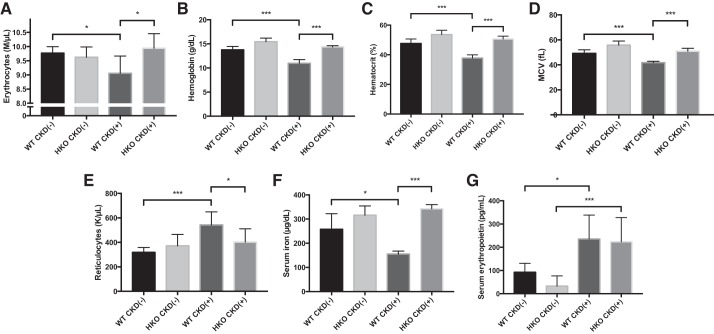Fig. 8.
Adenine diet induces anemia and iron deficiency, ameliorated by Hamp disruption. Blood samples were obtained at euthanasia and complete blood counts (CBC) were analyzed in 4 groups of mice: CKD(−)WT controls (n = 6), CKD(−) HKO controls (n = 6), CKD(+) WT (n = 6), and CKD(+) HKO (n = 5). Red blood cells (A), hemoglobin (B), hematocrit (C), and mean corpuscular volume (MCV; D) were all significantly reduced in the CKD(+) WT mice compared with CKD(−) WT controls. HKO CKD(−) control mice had slightly higher red blood cell indices than WT CKD(−) control mice, with the exception of the red blood cell counts. In CKD(+) HKO, there was either no (for red blood cell count and hematocrit) or minimal (for hemoglobin and MCV) reduction in erythroid parameters compared with HKO controls. As a result, all red blood cell parameters in CKD(+) HKO were not different from CKD(−) WT controls. E: the reticulocyte counts were elevated by 70.2% in the CKD(+) WT group compared with WT controls. Reticulocyte counts in CKD(+) HKO mice were not significantly different from CKD(−) HKO controls. F: serum iron concentration was significantly reduced in CKD(+) WT mice compared with CKD(−) WT controls. In CKD(+) HKO group serum iron was not different from CKD(−) HKO controls. G: serum erythropoietin levels were equally elevated in both CKD(+) groups compared with their respective controls. Error bars represent SD. *P < 0.05; ***P < 0.001.

